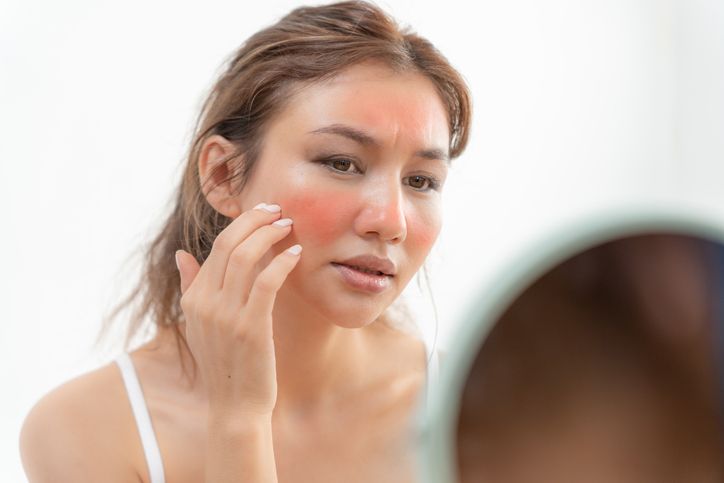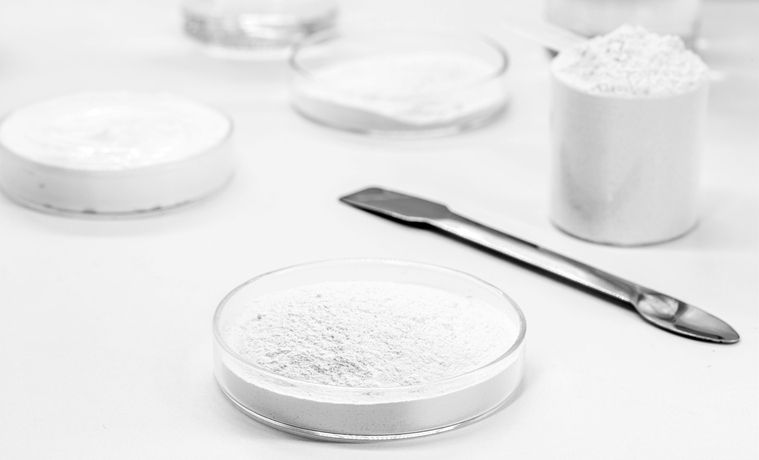Author: Leila Tan|Updated: 27 June 2025
If you have sensitive skin, you may find that some acne treatments are too harsh or upsetting for your skin. Acne is a common skin problem that mostly affects teens and young adults. It happens when oil, dead skin cells, and acne causing bacteria get into the pores of the face and block them up. This leads to inflammation and pimples. Acne can happen anywhere on the body, but it is most common on the face, chest, back, and shoulders. So…What can we do with acne when we have sensitive skin?

Types of Sensitive Skin and its Characteristics

Many people have sensitive skin, which is a common problem. It is marked by skin that is sensitive to things like products, the weather, or worry. Redness, itching, burning, dryness, or inflammation may show up on skin that is sensitive. Some people are born with sensitive skin, while others get it over time because of their surroundings or the way they live.
Sensitive skin can change as you get older because skin naturally changes as you grow older. For instance, as people get older, their skin gets thinner and less flexible, which can make it more likely to get hurt or sensitive. Changes in hormones can also affect the amount of oil and water in the skin, which can make it more or less sensitive. So, it's important to take care of sensitive skin at different times of life and change the way you take care of your skin to match.
Sensitive skin is a common condition that makes your skin more likely to react by turning hot, burning, or itching. Sensitive skin can be caused by many things, like genes, allergies, irritants in the surroundings, rosacea, eczema, or being too dry. There are different kinds of sensitive skin, each with its own cause and set of symptoms. There are four main types of delicate skin, according to some sources:
Allergic sensitivity
This kind of sensitive skin happens when the immune system overreacts to something it thinks is dangerous, whether it's inside or outside the body. In the worst cases, this can lead to inflammation, a rash, hives, or anaphylactic. Pollen, dust mites, animal dander, food, drugs, or makeup can all cause allergic reactions.
Breakout-prone sensitivity
This type of sensitive skin is more likely to get acne, blackheads, whiteheads, papules, or pustules when exposed to certain products or ingredients that clog the pores or hurt the skin. This can happen because of oily skin, changes in hormones, worry, or what you eat. Sensitive skin often breaks out when it comes in contact with heavy or rich creams, oils, perfumes, or comedogenic ingredients.
Heat-activated sensitivity
This type of sensitive skin responds to changes in temperature or humidity by making the blood vessels widen and the skin flush. This can make your skin turn hot, burn, sting, or itch. Hot weather, spicy food, drink, exercise, or hot water are all common things that can cause heat-activated sensitivity.
Dry/dehydrated sensitivity
This type of sensitive skin lacks oil and wetness, which makes it more likely to get hurt or irritated by things outside the body. This can make the skin flake, peel, crack, itch, or feel tight. Cold weather, low humidity, harsh cleaners, too much exfoliation, or getting older are all common causes of dry/dehydrated sensitivity.

Ingredients of Acne Treatment for Sensitive Skin You Heard and May Not Heard Of

Acne treatments come in many forms, such as creams, gels, lotions, washes, masks, and pads that are put on the skin and contain substances like benzoyl peroxide, salicylic acid, sulphur, or retinoids:
Benzoyl peroxide
Benzoyl peroxide is a topical medicine that kills germs and cuts down on the production of sebum, which is the oily substance that clogs pores. It can also make blackheads and whiteheads easier to get rid of.
Salicylic acid
Salicylic acid is a beta-hydroxy acid that gets rid of the top layer of dead skin cells. This makes pores less clogged and reduces acne. It can also make blackheads and whiteheads easier to get rid of.
Sulphur
Sulphur is a natural substance that can kill germs and reduce inflammation. It can help get rid of blackheads and whiteheads, as well as make your skin less red and swollen.
Retinoids
Retinoids come from vitamin A and can help treat acne by speeding up the skin's cell change and keeping skin cells from sticking together. They can also help get rid of pain and make scars look better.
You can find these ingredients in many over-the-counter and prescription items, like cleansers, creams, gels, lotions, pads, masks, and so on. A dermatologist may suggest different combinations and amounts of these ingredients based on the type and severity of acne.
Book Now to Experience
Acne Treatment
1 Minute Self-Registration
Date should not be before minimal date

Best Acne Treatment: Back to Natural Remedies
Unfortunately, not all acne prone skin can deal with so many chemicals, especially to people that have sensitive skin types. If you have sensitive skin and are looking for a spot treatment to get rid of or avoid acne, you might want to think about the following ingredients, which are known to calm, soothe, reduce inflammation, and lock in moisture:
Aloe vera
This plant extract can help heal and calm irritated skin because it kills germs and reduces inflammation.
Argan oil
This oil is full of antioxidants, fatty acids, and vitamin E, which can moisturise and protect the skin barrier.
Borage oil
This oil has gamma-linolenic acid in it, which is an omega-6 fatty acid that can help lower inflammation and keep the skin moist.
Calendula
The extract of this flower has anti-inflammatory and antiseptic qualities that can calm and heal skin that is inflamed.
Chamomile
Chamomile has anti-inflammatory and antioxidant properties that can make the skin less red and itchy.
Evening primrose
This oil has gamma-linolenic acid and other important fatty acids that can control how much sebum your skin makes and make it more flexible.
Jojoba
This oil is similar to the sebum that the skin makes naturally, so it can help keep oil production in check and keep the skin wet.
Hyaluronic acid
This molecule can attract and hold water in the skin, making it plump and moist.
You can look for spot treatments at the shop or online that have one or more of these ingredients. You can also use natural items like aloe vera gel or argan oil to treat spots directly on your skin. But you should always do a patch test on a small part of your skin before putting a new product on it to see if you have any allergic reactions or skin sensitivities.

Tips You Need: About Acne Treatment for Sensitive Skin
Start with a cleanser that is soft and doesn't have any harsh chemicals or scents. Use cold water to wash your face twice a day, and pat it dry with a soft towel. Do not scratch or rub your skin too hard, as this can make it even more red and sore.
Pick the right moisturiser, this is especially important for people with oily skin
Use a moisturiser that doesn't contain oil and doesn't clog your pores. Use it after you've cleaned your face and before you use any acne treatment. This will help keep your skin moist and keep it from getting irritated.
Get something with time-release formula
Choose an acne treatment with a smaller concentration of active ingredients or a time-release formula that gives you the ingredients slowly over time. This will make it less likely that you will get hurt or have other problems. You can also look for items with soothing ingredients like aloe vera, chamomile, green tea or oatmeal.
Best acne treatments usually is not about quantity
Only put a small layer of the acne treatment on the spots that need it. Stay away from the eyes. Use only one acne treatment at a time unless your doctor tells you to use more than one. Follow the directions on the product's label and don't use it more than suggested.
Fight acne smartly by testing it first
Try a new product on a small area of your skin first. Apply a small amount of the product to an area of your skin that won't be seen and wait 24 hours to see if you have an allergic response or something else bad happens. If you do, you should stop using the product right away and see a doctor.
You shall trust your decision to stop acne breakouts
Give your acne treatment time and stick with it. It could take weeks or months before you start to see effects. Don't stop using products or change them too often, because this can make your acne worse and hurt your skin.
Get sun protection to prevent future breakouts
This is one of the most important tip for acne prone skin. No matter how tedious you feel, it is a must to protect your skin from the sun by using a broad-spectrum sunscreen with at least an SPF of 30. Some acne treatments can make your skin more sensitive to the sun and make you more likely to get sunburns, dark spots, or age before your time. Sunscreen should be reapplied every two hours, or more often if you swim or sweat a lot.
Do not touch your acne, ever
If you touch or pick at your pimples, you could spread germs, get an infection, or leave a scar. Instead, if you need to, gently pop whiteheads or blackheads with a clean needle or a comedone extractor. After that, clean and cleanse the area and use a spot treatment with benzoyl peroxide or salicylic acid to help the spot heal faster.
If your acne is severe, won't go away, or doesn't react to over-the-counter treatments, you should see a doctor or dermatologist. You might need a strong medicine that you can only get with a doctor's prescription, like antibiotics, oral contraceptives, accutane (Accutane), or spironolactone. These medicines can have dangerous side effects, so your doctor will need to keep a close eye on you.
Book Now to Experience
Acne Treatment
1 Minute Self-Registration
Date should not be before minimal date

New Beauty has an Answer to Aid You in Fighting Acne
Acne scars, acne, pimples, whiteheads, and blackheads can all make a person feel bad about themselves. A lot has changed in how acne is treated. Acne can be treated with creams, pills, chemical peels, and other things, but not all of them work for a long time. Thus, New Beauty introduces the Acne Treatment for those who suffer from mild to severe acne.
The best thing about this treatment is that it doesn't require surgery, cuts, injections, acne medicine, or oral pills. It uses dual spiral suction and drainage technology to remove dead skin cells and open up pores at the same time. This reduces redness and infection caused by acne. Next, a hydrating serum is injected into the face to keep sebum production in check and encourage collagen production. This hydrating serum can also get into the deepest layer of skin to hydrate and nourish the skin cells, calming acne-prone skin in the process. It also stops the sebaceous glands from making too much oil, so it’s definitely great news to whoever has sensitive skin but also gets acne from time to time!
New Beauty's Acne Treatment
Conclusion
Having acne can be annoying and make you feel bad about yourself. But with the right care and treatment, even if you have sensitive skin, you can get better and healthier skin. Make sure to treat your skin gently and stick to a practice that works for you!
Book Now to Experience
Acne Treatment
1 Minute Self-Registration
Date should not be before minimal date
FAQ
1. What kinds of acne can be treated with benzoyl peroxide?
Benzoyl peroxide can treat mild to moderate inflammatory acne, which is made up of red bumps that are filled with pus and have names like pustules, papules, cysts, and nodules. It can also help stop new pimples from appearing. But benzoyl peroxide might not work as well for blackheads and whiteheads, which are not caused by germs but rather by clogged pores. Retinoids that are put on the skin may be a better choice for these kinds of acne.
2. How do I use benzoyl peroxide spot treatment?
There are different kinds of benzoyl peroxide, like gels, creams, lotions, cleaners, and spot treatments. It is also available in different strengths, from 2.5% to 10%. To see how your skin responds, you should start with the lowest concentration and the least amount of application. You can slowly increase the dosage and how often you take it, but you shouldn't take more than 10% or twice a day unless your doctor tells you to. You should put benzoyl peroxide on clean, dry skin and stay away from your eyes, mouth, and other sensitive areas. Also, you should wash your hands after using it and keep your hair, clothes, and fabrics away from it because it can bleach them.
3. How can people with excess oil fight acne?
People who have too much oil on their skin may have more acne because the oil can block the pores and trap bacteria. Some ways to get rid of acne caused by oily skin are: Using a gentle cleaner with salicylic acid, benzoyl peroxide, or glycolic acid to wash your face twice a day. These ingredients can help remove dead skin cells and keep hair shafts from getting clogged. Staying away from things that are oily or greasy, like hair products, makeup, or sunscreen. These can make your skin even more oily and lead to more pimples. Using blotting sheets or medicated pads to remove oil throughout the day. These can help the face stay clean and less shiny.
4. What kind of bacteria causes acne, and how does it make the face look?
Cutibacterium acnes (C. acnes) is the bacteria that has been linked to acne the most. It is a normal part of the skin, but if it grows too much, it can block the hair cells and cause redness and pimples. C. acnes can also make enzymes and irritating chemicals that can hurt the skin and make the immune system react.
5. How does salicylic acid help treat acne?
Salicylic acid is a type of keratolytic agent that helps skin shed and keeps hair shafts from getting clogged. By making the pH level of the skin lower, it can also reduce swelling and germ growth. Most of the time, salicylic acid is put on the skin as a cream, gel, lotion, or pad.
Recommended Articles
COPYRIGHT© NEW BEAUTY MANAGEMENT LIMITED 2026. ALL RIGHT RESERVED.




